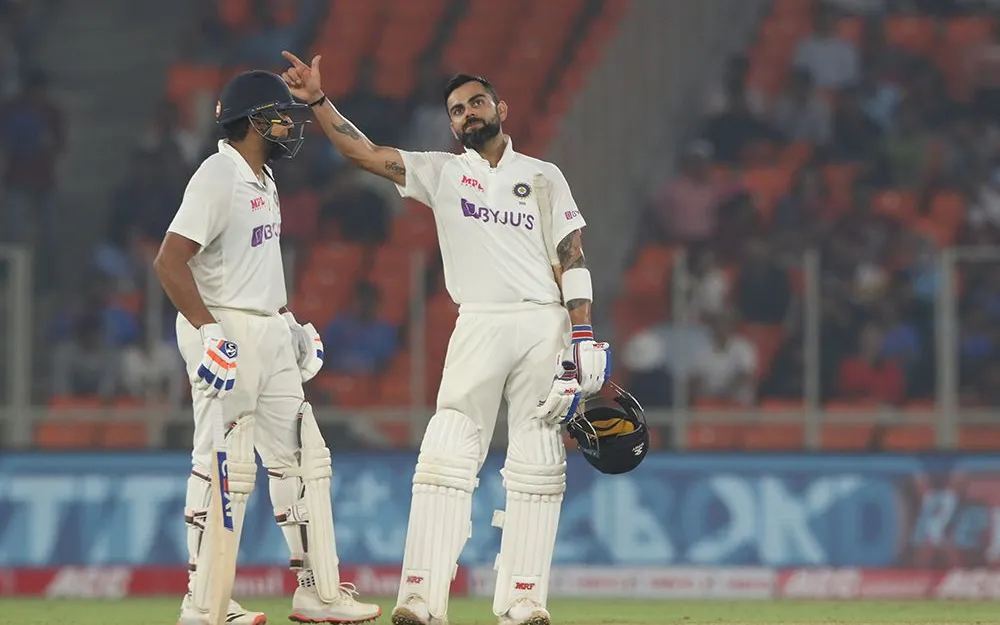Virat Kohli, Cheteshwar Pujara, and the learnings from Will McAvoy
Jeff Daniels, in Aaron Sorkin’s political series The Newsroom, had a beautiful insight when the panelists asked him to explain why America was the greatest country in the world. Daniels, playing Will McAvoy in the show, shut them up with an explosive monologue before ending with a legendary line.

“The first step in solving any problem is recognizing there is one.”
Perhaps the aptest ending to a fine scene, McAvoy not only owned the room filled with journalists, professors, and students from all across the States, but also gave away a line deeply intrinsic to human characters from all walks of life. If only the team management can get the entire Indian batting unit to sit together and watch the iconic scene, a lot of problems will definitely be buried to death.
There is a genuine concern here. Since the Sydney Test of 2019, in which India drew to win the Border-Gavaskar Trophy Down Under for the first time, Ajinkya Rahane is the only batsman to have scored above 1000 runs, and among the top six batsmen to have played at least five games, Cheteshwar Pujara has the lowest average with 29.66. Taking the home 2019 season off, Virat Kohli averages less than 27 in the last six matches, which is genuinely a concern if things factored into a box.
On an Ahmedabad wicket, where the ball turned from the first ball, it would be prudent to analyze things from a classical perspective for where the skill against spin mattered for little. Truth be factored, Indian batsmen have done exceedingly well in India and beyond to be crucified for the odd failures that came their way. However, this is about understanding the problems and acting on them for the long-term benefit.
Pujara’s importance to this Indian team is not about how much he scores but about how many hours he spends on the crease. But in India, when defending on the loop is not a bare necessity as it is in SENA countries, Pujara needs to score the way he used to do in the past for India to hold an advantageous position on rank turners which could get tricky at any point in time. But this series, it seemed like he has lost a bit of edge or has been in the cocoon of batting on the Australian wickets since then.
“I don’t take any bowler lightly - whether it’s Jack Leach or any other bowler who visits India. On a turning track, you can’t take any bowler lightly. But yes, Jack Leach has been bowling really well; has been consistent with his line and length. But as a batter I also felt that I’ve been batting well although I got out twice,” Pujara had said in the pre-match press conference ahead of the question, fielding a question posed by SportsCafe.
“One has to be very confident as a batsman and I feel that with my preparation, and with the way I’ve played in Indian conditions, it’s a matter of time. I started off well and had a couple of dismissals which I did not like, but overall, most of the Indian batters are used to playing spin and we just need to show that we can do that again and again. The next two matches are an opportunity for us to play well against our spinners.”
Turned out, it wasn’t. The performance in this series is not an indictment of Pujara’s abilities - he is one of the finest players of spin in the modern generation of Test batsmen - but a kind of blip that is extremely rare for him. The approach of Pujara and Kohli against spin has always been more proactive than reactive but this series, it has been the other way around, leaving a lot of things to “what could have been”.
In Cricket, Test cricket especially, the right frame of mind and clarity of thoughts play a bigger role than any other sport. Test Cricket runs over a period of time and it tests one skill and patience. And in the ongoing series, spinners clearly have had the upper edge since the second innings of the first Test in Chennai. However, it seems both Pujara and Kohli want to brush the issue aside to pose their confident avatar, presumably stopping the work that needs to be done to come out of this phase.
Kohli is a world-beating cricketer in all three formats of the game, for whom scoring runs is the easiest thing in the world. A bad patch for Kohli doesn’t come that often, but when you cross six Tests and as many ODIs without scoring a single century, questions will arise. Of course, because of the high standards that he has set for himself, it would be a concern for many, no matter, how many crucial half-centuries he scores in the process.
But with Kohli, we also know that winning takes precedence over any personal milestones and thus him brushing aside his own performance for the larger good of the team isn’t really a surprise. While this is an admirable quality, one would be left to imagine, does Kohli have a problem in admitting the frailties to himself and thus instead letting go of an opportunity to put up runs on the board?
A comparison with Steve Smith is justified in this context. As soon as he failed to hit the stride in UAE during the Indian Premier League, he instantly started to work on his batting till he “found his hands” and hit a couple of centuries in Sydney. He couldn’t quite replicate the same in the Test, but bravely admitted that Ashwin had the wood over him in the red-ball series. Smith is a nut, for whom batting is the ultimate act of self-liberalization, thus he couldn’t afford to have a bad batting day, at least for his own mental peace.
The process works quite differently for Kohli and Pujara but if they can understand that there’s a problem currently, the duo possibly can shrug that off sooner than they would do otherwise. It is like the story McAvoy told MacKenzie McHale how the doctor stopped the habit of kid shredding paper all day long.
"There's a story about a little kid who keeps shredding paper and his parents take him to all kinds of doctors to get him to stop shredding paper. And finally, they take him to the most expensive doctor in the world who turns to the kid and he says, 'Kid if you stop shredding paper, your parents will stop dragging you to doctors.' And the kid turns to his parents and says, 'Why didn't you just say so?'"
Perhaps, in that, there is a lesson for Kohli and Pujara too.

Comments
Sign up or log in to your account to leave comments and reactions
0 Comments